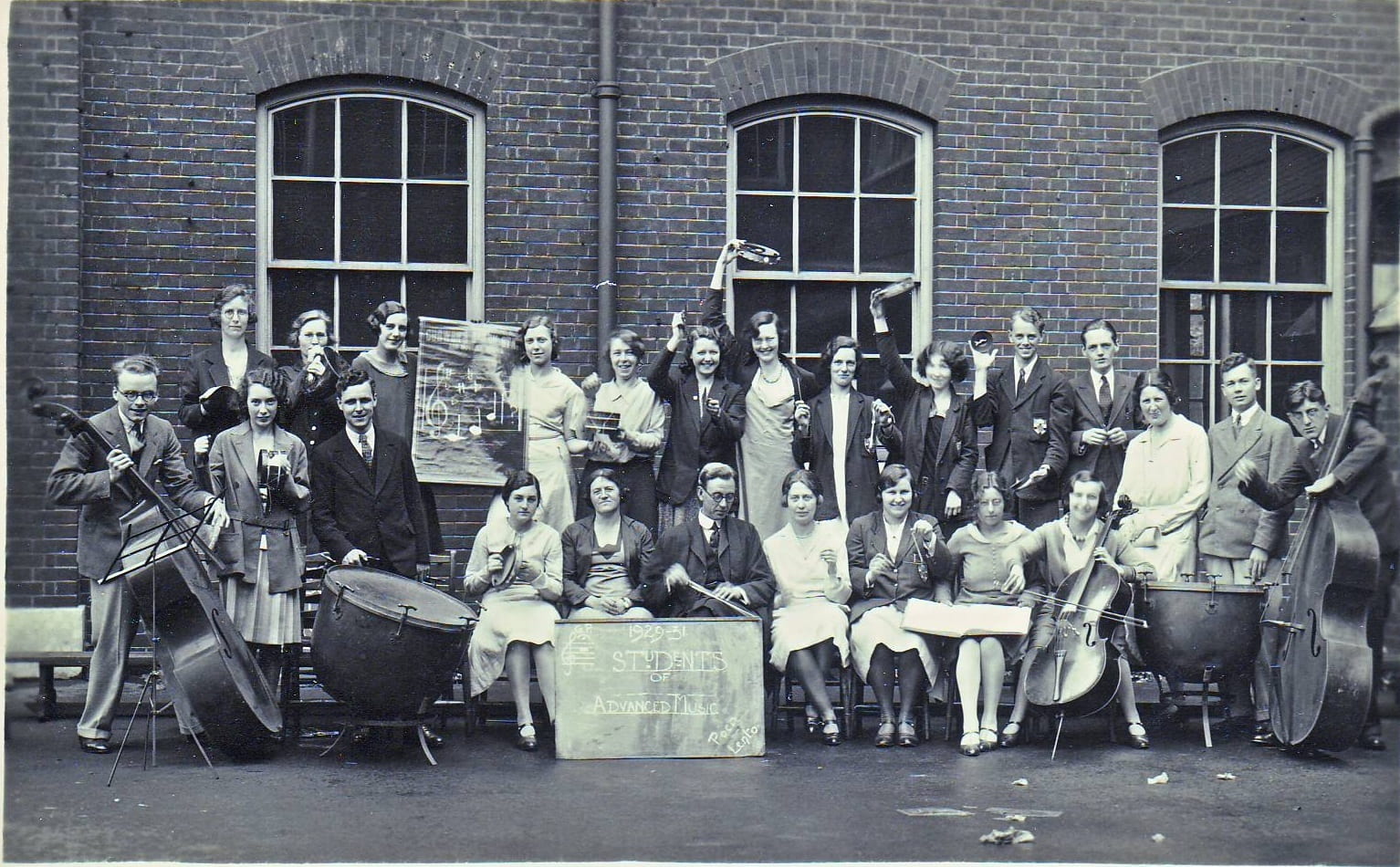
Advanced Music Class Goldsmiths College 1929-31. This animated and lively group photo features two mischievous double bass players at either end – the instrument that Spike Milligan took with him on the tram to his evening orchestral music class in the middle 1930s. Image: Goldsmiths, University of London.
Spike Milligan (1918-2002) is credited with revolutionising British comedy through his chaotic, surrealist, and subversive imagination.
He created the seminal radio comedy The Goon Show (1951-60), and wrote more than 50 books including six on his Second World War experiences.
To say he was larger and crazier than life itself would be an understatement.
And he was also a student of Goldsmiths College.
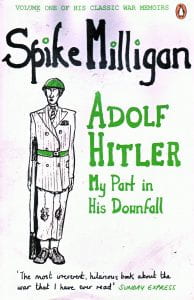
Spike Milligan was well-known for his zany and irreverent though affectionate memoirs of his time in the Royal Artillery in World War Two.
He attended a one term music orchestration course in the middle 1930s at the college’s evening department of Adult Education.
It seems this experience represented an important part of what he saw as his development as a musician and composer.
It is emphasised by Ned Sherrin who wrote his entry (2006) for the Oxford Dictionary of National Biography:
“While working as an assistant storeman at Keith Prowse in Bond Street, Terence Milligan bluffed his way into a part-time evening course in orchestral practice at Goldsmiths’ College, Lewisham, and subsequently joined a local band, Tommy Brettel’s New Ritz Revels, playing drums, guitar, and trumpet, and occasionally providing vocals.”
And it is also variously mentioned by his three biographers Pauline Scudamore, Dominic Beehan and Humphrey Carpenter.
John Cleese recognised his influence on Monty Python’s Flying Circus when he said: ‘Milligan is the great god of us all.’
This television comedy sketch of a tramp picking up his baguette in a café only to find that it produces a clarinet solo by Gershwin is a superb example of how Milligan’s surrealist imagination was also centred in sound and music.
Terence (Spike) Alan Milligan was actually brought up in India because his father Leo Alphonso Milligan was in the British Indian Army. Spike was born near Bombay in 1918.
For a while the Milligan family lived in Brigade House in Rangoon, Burma and remembered being visited by the famous author George Orwell when he was a police officer in his original identity of Eric Arthur Blair.
But in 1932 after the world-wide recession, cutbacks in military expenditure meant that Spike’s father was pensioned off at the age of 42.
The family, including his mother Florence and younger brother Desmond, left the splendour of colonial life with servants to face the hardships of unemployment and despair in a two room attic flat in Catford at 23 Riseldine Road, SE23.
Spike was fifteen years old, disaffected, and further disillusioned when he was turned down by the RAF.
He had a series of dead-end jobs including laundryman, and packer for a tobacco firm.
That is where he began to steal cigarettes to raise funds to buy his first trumpet.
It was the eloquent speech of mitigation by his father Leo at his trial that persuaded the magistrate to give him an absolute discharge on the grounds that his son’s genius as the world’s greatest future trumpet player deserved urgent consideration.
Spike liked to reminisce about his father’s blarney particularly when as a child he had woken him up in the middle of the night to confess that he had not shot any tigers.
When asked for an explanation Leo replied: ‘What would you prefer the boring truth or an exciting lie?’
Spike’s poem ‘Catford 1933’ captured the family’s fall from grace:
“My father places his unemployment cards
in his wallet – there’s plenty of room for them.
In greaseproof paper my mother wraps my
banana sandwiches.
It’s 5.40. Ten minutes to catch that
last workman’s tram.”
The tram from Catford to Lewisham Way and Goldsmiths’ College would be the way Spike struggled with his double bass to attend the evening course in orchestral practice.
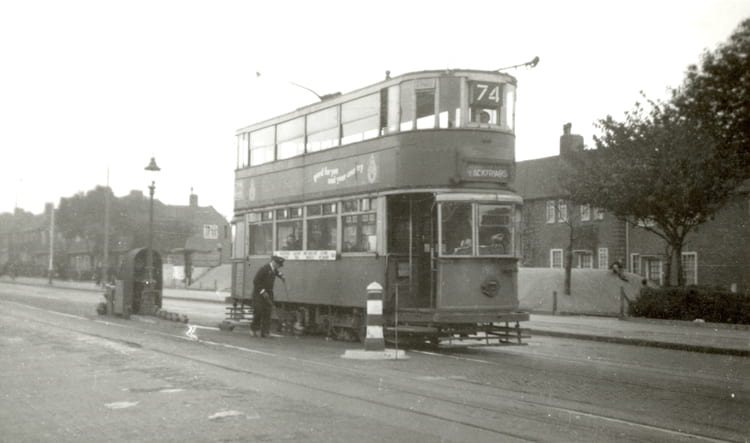
Number 74 Tram from Catford to Lewisham and Blackfriars. Image: Lewisham Council Archives.
Humphrey Carpenter speculated that it is likely Spike had to deal with the conductors spinning the time-honoured joke that has irritated classical bass players since the instrument was invented:
“How do you get it under your chin?
Answer: By keeping your big mouth shut.”
Biographer Pauline Scudamore wrote: ‘He was not really of the standard required, but he bluffed his way into the class and it says much for both Goldsmiths’ insight and the immediacy of Milligan’s responses that he survived the course.’
When arriving for the first lesson he discovered that all the other string instrumentalists were rubbing resin into their bows; something Spike and his double bass lacked completely.
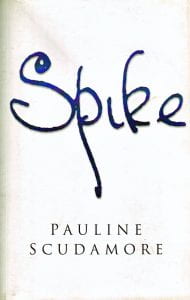
Biography by Pauline Scudamore first published in 1985 and 3rd edition in 2003.
He pretended that he had left his non-existent bow at home. The music teacher said he could play pizzicato little knowing that at the time that was the only way Spike could play it.
Scudamore says Goldsmiths taught him the rudiments of harmony and counterpoint, the discipline of formal music and sight-reading.
Milligan said:
“Well, Goldsmiths was the nearest I ever had to a musical education. I suppose I wanted to show off a bit. To show that I didn’t only strum, and that I could play with a bow if I wanted to, and that I took music seriously.”
The college was a thriving centre for music in all its dimensions. It had its own music society known as the Clef Club.
These were the years when the Goldsmiths’s Choral Union and Goldsmiths’ Symphony Orchestra trained by Frederick Haggis were formed, and a String Orchestra conducted by Miss Kitty Kennedy became prominent in local music festivals.
Reginald Jevons was famous for taking group piano lessons with dummy keyboards when there were not enough pianos to go round.
In 1935 there were 300 musicians attending the Adult Evening Department – one third of the overall total of students.
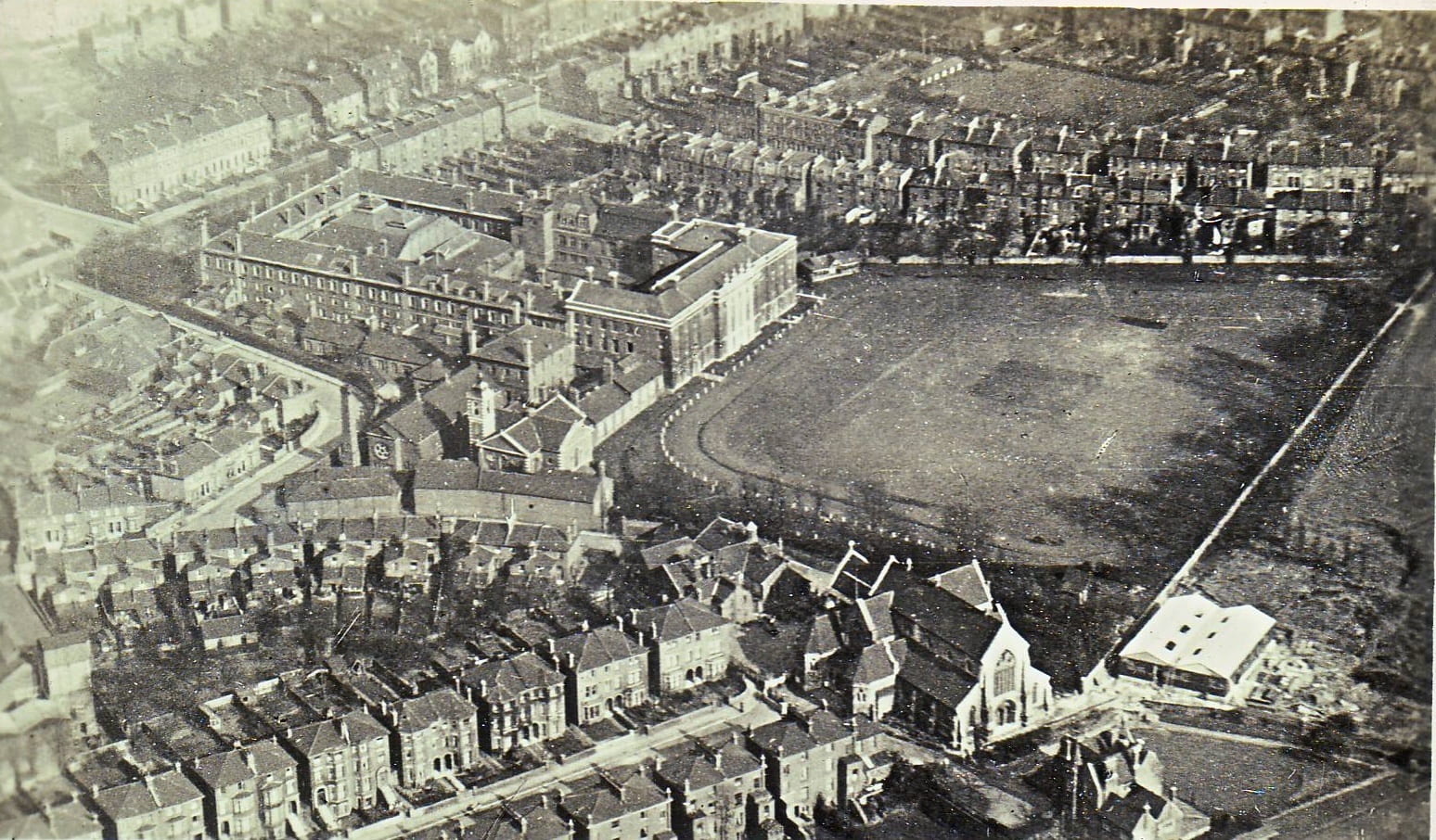
An aerial view of Goldsmiths College at the time Spike Milligan attended his evening course. The college ‘back field’ had an athletics running track and the swimming pool inherited from the Goldsmiths Company’s Technical and Recreative Institute established in 1891. Image: Goldsmiths, University of London.
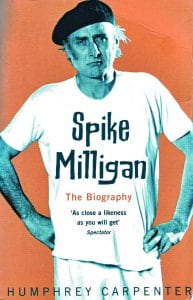
The biography of Spike Milligan by Humphrey Carpenter first published in 2003.
Jevons wrote optimistically in the Anvil, the Evening Students’ Association magazine:
“Of the future surely there can be no mistake. We have to thank those whose foresight led us along this path of stimulating the love of good music, and in our own Department we rejoice to see the ideals being set before us, which gave opportunity for self-expression, and a sense of well-being which accompanies the rational expression of the faculties.”
Such pompous classicism did not appeal to Spike Milligan.
He told another of his biographers, Dominic Beehan, he didn’t like Goldsmiths’ because it was ‘all classical music’ and at the time he only wanted to play jazz.
There is no doubt that having creative control and confidence over musical notation, arrangement and orchestration had an impact.
It all underpins the brilliance of such anarchic and in its own way, progressive and experimental musical pieces such as the Ying Tong Song first released by Decca in 1956.
Milligan says he wrote the Ying Tong Song in ten minutes during a journey on the London Underground.
The ‘I’m Walking Backwards for Christmas’ song was also written in 1956 and has remained another iconic sound track for what Dominic Beehan described as the Goons’ auditory surrealism.
Spike was not the only Milligan to attend Goldsmiths.
In 1948 his younger brother Desmond was eligible for a post World War Two education grant to study the three year Art Diploma course.
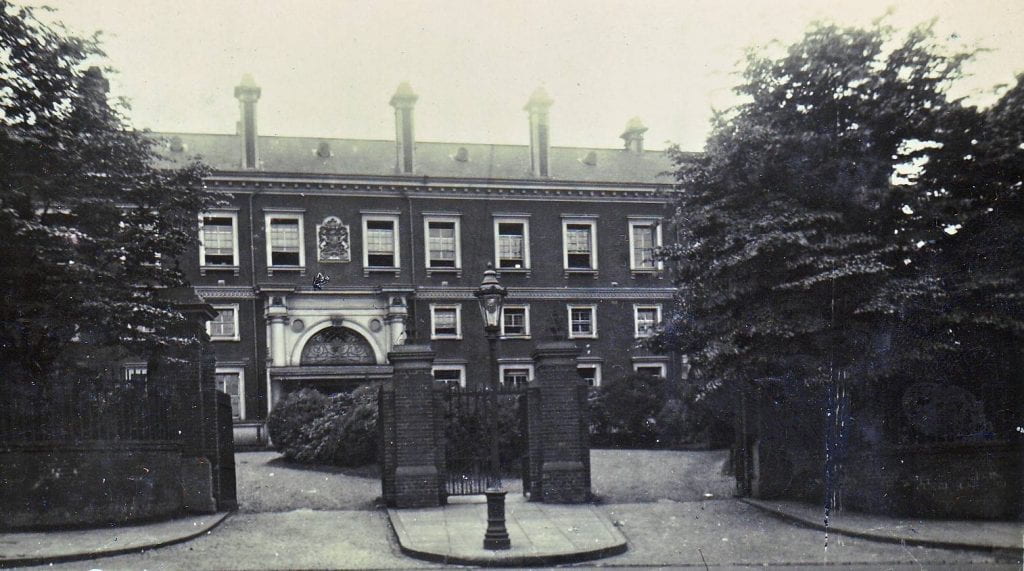
The entrance to Goldsmiths College as it would have been in the late 1920s and early 30s. Image: Goldsmiths, University of London.
In the early 1950s Desmond, and his father Leo and mother Florence emigrated to Australia while Spike teamed up with Michael Bentine, Harry Secombe and Peter Sellars to form the famous Goons and as has often been said, the rest was history.
Another Goldsmiths’ connection exists through one of his sons, James Turlough, whose mother, the artist Margaret Maughan also went to Goldsmiths’ College.
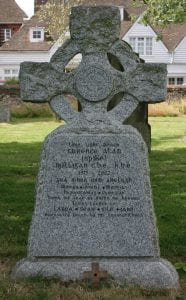
Spike Milligan’s headstone with the Irish Gaelic inscription ‘I told you I was ill’. Image: Domer48’fenian’
When Spike Milligan died in 2002 the intense media coverage indicated that a national figure of great cultural significance had passed away.
However, a dispute over his passport application in 1962 led to his adopting Irish citizenship.
And the line he wanted on his gravestone ‘I told you I was ill’ is inscribed in Irish Gaelic as Dúirt mé leat go raibh mé breoite.
Ned Sherrin said Spike Milligan ‘opened new doors of irreverence and absurdity in his mission to entertain.’
He described him as ‘a troubled, gifted man with a unique mind, an affinity for children, and a puzzled pity for humanity and the animal world.’
These are all qualities that could be said to perfectly qualify him for the honour of being one of the Goldsmiths’ alumni.
That’s So Goldsmiths– a forthcoming history of the university is being researched and written by Professor Tim Crook.
Goldsmiths History Project Podcast by Professor Tim Crook